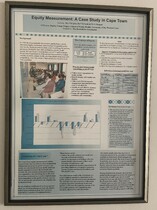| dc.contributor.author | Tyler, D.P | |
| dc.contributor.author | Scott, V.E | |
| dc.contributor.author | Reagon, G | |
| dc.date.accessioned | 2023-02-13T10:43:31Z | |
| dc.date.available | 2023-02-13T10:43:31Z | |
| dc.date.issued | 2023 | |
| dc.identifier.citation | Tyler, D.P. Scott, V.E. and Reagon, G. (n.d). Equity Measurement: A case study in Cape Town. University of the Western Cape School of Public Health | en_US |
| dc.identifier.uri | http://hdl.handle.net/10566/8419 | |
| dc.description.abstract | Background: In 1994, the democratically elected post-apartheid government inherited a highly fragmented, centralised and inequitable public care service. Much progress has been made in unifying the services, previously divided by race, and establishing a district health system. In Cape Town, a metropolitan area of 3.3 million people, the previous fragmentation of the services has resulted in marked inequity in public primary health care expenditure along racial and geographical lines. The extent of this inequity has not previously been quantified | en_US |
| dc.language.iso | en | en_US |
| dc.publisher | University of the Western Cape | en_US |
| dc.subject | health expenditure | en_US |
| dc.subject | public primary health care | en_US |
| dc.subject | Cape Town | en_US |
| dc.subject | equity measurement | en_US |
| dc.subject | equity gap | en_US |
| dc.title | Equity Measurement: A case study in Cape Town | en_US |
| dc.type | Image | en_US |

